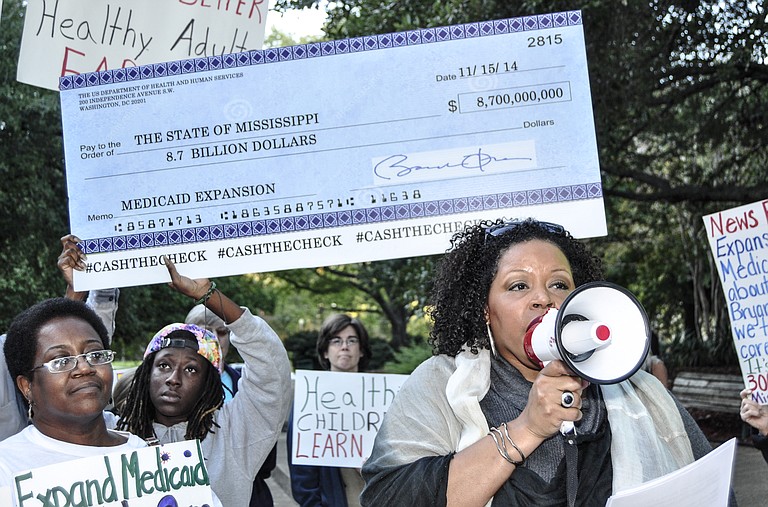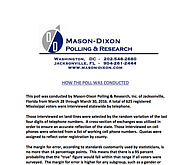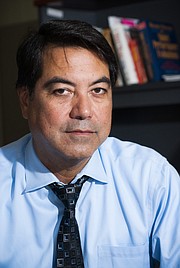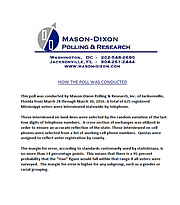At a 2014 rally, demonstrators carried a large check for $8.7 billion that contained the signature of President Barack Obama to represent the amount the federal government would contribute if Mississippi loosened Medicaid eligibility requirements. File Photo. Photo by Trip Burns.
Monday, April 11, 2016
Despite the Mississippi Legislature's inaction with Medicaid expansion this session, a new poll shows that more than 50 percent of Mississippians support expanding Medicaid, which could provide health-care coverage to an additional 280,000 Mississippians, as well as provide tax credits for low-income adults. The Mississippi Health Advocacy Program paid for the four questions on the April Mason-Dixon poll of 625 Mississippians, which asked Mississippians about the specifics of expanding Medicaid in the state.
Roy Mitchell, the MHAP executive director, said his organization conducted a similar poll last year. This year, he said, Republican support for Medicaid expansion jumped.
"Equity arguments in this state don't get a lot of traction from Democrats and Republicans alike; that's the reason the issue isn't taken up," Mitchell said. "But when you start talking economics, people start to listen."
If Mississippi expanded Medicaid before the end of fiscal-year 2017, the state would not have to pay anything for the expansion. Louisiana is the most recent state to expand Medicaid in the U.S., and states are eligible for Medicaid expansion without putting up any federal match, Mitchell said, through fiscal-year 2017.
"The Legislature is over there and about to wrap up, and they've done nothing on this," Mitchell said. "We get hit with a lot of 'What are we doing with Medicaid expansion' questions ... we place a lot of responsibility on our elected leaders on this."
Questions on the poll explicitly explained who Medicaid expansion would affect and who benefits from Medicaid coverage.
One question from the 2016 poll said, "Medicaid is a federal and state health insurance program for poor people and some other needy populations. It is funded by state and federal funds. The federal health reform law allows states to expand Medicaid to cover individuals who have an income level up to $15,420 annually. It is estimated this expansion would provide coverage to an additional 280,000 Mississippians. Do you support or oppose the expansion of Medicaid coverage in Mississippi as I have just described?"
53 percent of respondents supported Medicaid expansion as described in the question. Another question addressed Medicaid expansion alternatives like using "federal Medicaid dollars to provide tax credits and financial assistance to low-income adults to help those individuals purchase private health insurance plans." Arkansas and Tennessee are rolling out these types of plans currently, and 48 percent of Mississippians polled agreed with that type of alternate expansion.
Legislative support for Medicaid expansion is weak. No Medicaid expansion bills made it out of committee this session, and if the state does not expand before 2017, they will have to pay a portion of the cost for expansion, which would be less than 10 percent of the total cost.
In a recent press conference call with U.S. Department of Health and Human Services and Medicaid officials, federal officers said that Medicaid expansion can help alleviate state agency pressure to provide behavioral and mental health services to the state's Medicaid population.
Richard Frank, the assistant secretary for planning and evaluation at the U.S. Department of Health and Human Services, said that Medicaid expansion in a state like Mississippi could help cover those suffering from mental and behavioral health disorders without insurance.
"Mississippi, we estimate, has about 61,000 people who are uninsured with a mental disorder below the poverty line," Frank said on the call, when the Jackson Free Press asked how Medicaid expansion could impact those in Mississippi.
A 2015 Gallup poll, cited on the conference call, shows that states that have expanded Medicaid have the greatest reductions in uninsured rates. Mississippi's Medicaid enrollment has grown in the past three months. Currently there are 729,741 Mississippians enrolled in Medicaid, division numbers show.
Clarification: This story has been updated with clarified data from the 2016 Mason-Dixon poll. We apologize for any confusion with 2015 data earlier.
Email state reporter Arielle Dreher at [email protected] and follow her @arielle_amara on Twitter.




Comments
Use the comment form below to begin a discussion about this content.
Sign in to comment
Or login with:
OpenID